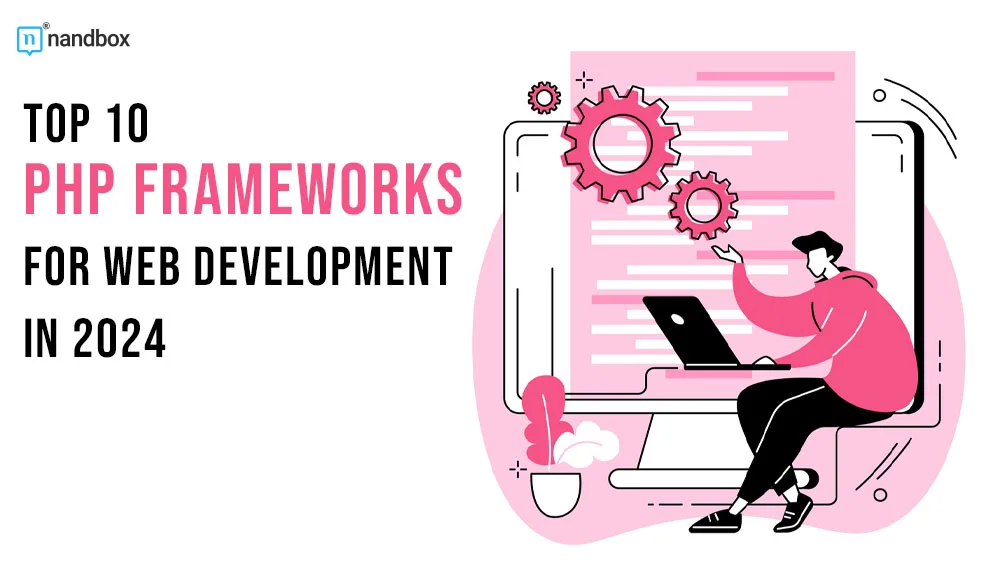Web development in 2024 has become a crucial online marketing resource for businesses in Kuwait. So, it is essential to build a robust and scalable web application utilizing the right tools and technologies. Research shows that 76.1% of all websites are created using PHP frameworks. Yes, it’s true that PHP is the most popular server-side scripting language for building web apps in Kuwait, as it offers versatility and ease of use. However, this technology includes many frameworks that can help in structured and efficient website creation. And choosing one among these known PHP frameworks for your business’s web development in Kuwait can be a critical task.
PHP Frameworks for Web Development
In this post, we’ll explore the 10 top-ranked PHP frameworks for web development in 2024 you can choose from.
If you’re considering web development in Kuwait, these insights will be particularly valuable. We have also included the factors you can consider while selecting an ideal PHP framework for your website.
Why Use PHP Frameworks for Web Development?
With the help of PHP frameworks, developers can expedite the development process by having access to the foundation of prewritten codes. Developers can design safe, scalable, and stable web applications with the help of these frameworks, as they include a variety of tools and libraries.
Using a PHP framework, focus on creating functionality increases with the elimination of writing repetitive codes. They also ensure adherence to best practices, which can enhance code quality and lower errors, resulting in building a top-notch website. Also, the available documentation and tutorials lower the overall development time, leading to reduced costs for businesses in Kuwait.
10 Best PHP Frameworks for Web Development in 2024
Here are the top 10 PHP frameworks that can be used for building secure and fully functional websites for your Kuwait-based business,
1. Laravel
One of the most well-liked PHP frameworks is Laravel, which is renowned for its robust features and attractive syntax. It offers powerful security features, the Blade templating engine, and Eloquent ORM, among other technologies. Because it makes typical tasks like routing, authentication, and caching simple, Laravel is a great option for projects of all sizes. Its sizable community guarantees plenty of assistance and regular updates.
2. Yii 2
Yii 2 is an efficient PHP framework ideal for creating cutting-edge websites. It has features like role-based access control, authentication, and caching and adheres to the MVC design. Because of Yii 2’s strong extensibility, developers can quickly incorporate third-party tools and frameworks. Its implementation of active records and robust query builder facilitate smooth database interactions.
3. Symfony
A versatile and modular PHP framework, Symfony offers reusable parts for creating online applications. Symfony, renowned for its scalability and durability, is frequently utilized for intricate projects at the corporate level. A vast array of tools and libraries, like Doctrine for ORM and Twig for templating, are part of its ecosystem. Expert developers prefer Symfony because of its focus on best practices and high-quality code.
4. CodeIgniter
A simple-to-learn and intuitive PHP framework, CodeIgniter is lightweight. For developers who require a straightforward and streamlined toolkit to build fully functional web apps, it’s an ideal choice. CodeIgniter is perfect for shared hosting setups because of its minimal footprint and great performance. Both beginners and expert app developers find it appealing due to its simple setup and low configuration needs.
5. Phalcon
One of a kind PHP framework, Phalcon is built in C and distributed as a PHP extension. It can provide outstanding performance with minimal resource usage thanks to this method. Phalcon offers tools to developers that include caching, ORM, and MVC design. Because of its efficiency and speed, it can be used for demanding projects and high-performance applications.
6. Zend Framework
Zend Framework is a flexible PHP framework that is well-suited for big organizations as it is rich in features. It is now a part of the Laminas project and provides components for database interfaces, caching, and authentication. As this framework is modular, developers can utilize just the components they require, which makes it a flexible option for a range of applications.
7. Cake PHP
CakePHP is a robust PHP framework that minimizes the need for laborious configuration by adhering to the convention over configuration concept. It provides a wide range of capabilities, such as scaffolding, integrated validation, and an ORM. CakePHP is a great option for developers that need to build apps rapidly because of its emphasis on code generation and rapid development.
8. Pixie
Pixie is a micro-framework for PHP that is simple and lightweight. This framework is designed for small to medium-sized applications. It is simple to modify and customize, supporting and offering a straightforward routing mechanism. Because of Pixie’s minimalist design approach, flexible apps can be created with little overhead.
9. Fuel PHP
FuelPHP is a community-driven PHP framework with a focus on modularity and flexibility. It contains a robust ORM, caching, and input filtering, and it adheres to the HMVC design. Projects requiring a high level of customization can benefit from FuelPHP’s flexibility and support for modular code structuring.
10. Slim
Slim is a PHP micro-framework intended for creating compact, light-weight APIs and websites. It’s a great option for developers who need to quickly create single-page apps or RESTful APIs because of its well-known simplicity and ease of use. Because of Slim’s simple design, developers can include only the components that are necessary to ensure high performance.
How to Choose a Suitable PHP Framework for Your Web Development?
Selecting the right PHP framework for web development depends on several factors. Take consideration of the following aspects:
-
Project Requirements and Scope
Consider the size and complexity of your project. Frameworks with extensive capabilities and scalability, like Symfony or Laravel, could be useful for larger projects. Lightweight frameworks like CodeIgniter or Slim may be better appropriate for smaller applications.
-
Framework’s Familiarity
Evaluate how popular the framework is. Choosing one that has comparatively more familiarity can reduce development time and ensure higher quality for your business website. Consider the availability of documentation, tutorials, and community support when making your decision.
-
Performance and Scalability
If your web application requires focusing on performance and scalability, it is essential to opt. for PHP frameworks that support future updates. Phalcon and Laravel are the top choices for businesses, as they offer extensive performance optimization features to handle the expected growth in their user base.
-
Overall Cost Involved
Cost is the foremost factor when building any website project. There are some PHP frameworks for web development that can require additional resources and plugins. This can increase the overall cost of creating a website. Make a decision after considering the cost of hosting and maintenance involved in the framework.
-
Ease of Maintenance
Consider the long-term maintenance requirements of your application. Frameworks with active communities and regular updates, like Laravel and Symfony, are more likely to receive ongoing support and improvements. Select a framework that makes the maintenance and upgrading of your application easy over time.
Conclusion
PHP framework plays a crucial role in streamlining the workflow of the website development process. The cost and time of building the web application are also dependent on the decided PHP framework. So, it is important to choose one that fits your project requirements and goals.
In this post, we have listed the 10 best PHP frameworks for web development, along with the factors you can consider while selecting one.
The frameworks mentioned above provide a variety of solutions to meet your demands, regardless of the complexity of the web application you’re developing. Consider finding web development companies in Kuwait who can guide you in selecting the framework that can work best for your company’s projects.







